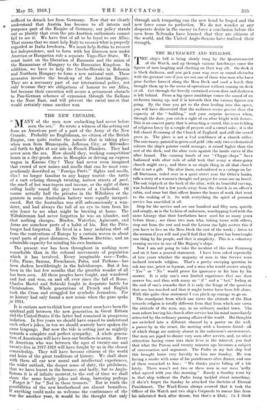THE NEW CRUSADE.
"/MANY of the men now embarking had never before seen the sea." So wrote a witness of the setting out from an American port of a part of the Army of the New Crusade. Probably no Englishman, no citizen of the British Empire, can quite realize the miracle that is taking place when men from Minneapolis, Jefferson City, or Milwaukee sail forth to fight at oar side in French Flanders. They had never seen the sea. How should they, working competition' hours in a dry-goods store in Memphis or driving an express wagon in Kansas City ? They had never even imagined that crowd of new noises and smells that can be most com- pendiously described. as "Foreign Parts." Sights and smells, alas ! no longer familiar to any happy tourist—the rattle of a cart echoing through twisting, narrow streets of pave, the smell of hot wax-tapers and incense, or the sight of daws sailing lazily round the grey towers of a Cathedral. Of course actually half the privates in the Wiltshires or the gunners in some Australian battery were equally inexperi- enced. But the Australian was still subconsciously a wan- derer, and had always the tail of an eye to turn from his wire fence to see what might be brewing at home. The Wiltshireman had never forgotten he was an islander, and that nothing changes. Minden, Waterloo, Agincourt, and Arras are somehow parts of a habit of his. But the Pitts- burger had forgotten. He lived in a busy isolation shut off from the contentions of Europe by a curtain woven in about equal parts of great distances, the Monroe Doctrine, and an admirable capacity for minding his own business.
The present war has been throughout in nothing more remarkable than in the colossal movements of population which it has involved. Every imaginable race—Turks, Celts, Finns, Saxons, Frenchmen, Poles, and Pathans—has been shaken bewilderingly in the kaleidoscope. But it has been in the last few months that the greatbst wonder of all has been seen. All these peoples have fought, and wandered and lost and won, on and off, ever since the fall of Rome. Charles Martel and, Sobieski fought in desperate battle for Christendom. Whole generations of French and English took the Cross and struggled for symbolic Jerusalem. For us history had only found a new music when the guns spoka in 1914.
It is curious now to think how great must soon have been the spiritual gulf between the new generation in Great Britain and the United States if the latter had remained in prosperous isolation. In five years we should have ceased to understand each other's jokes, in ten we should scarcely have spoken the same language. But now the tide is setting just as mightily towards a complete and perfect sympathy. A whole genera- tion of Americans will have been our brothers-in-arms. Every fit American who was between the ages of twenty-one and twenty-five in 1917-1918 will have fought by us in the closest comradeship. They will have become citizens of the world and heirs of the great traditions of history. We shall share with them all our new moral and intellectual experiences, the wider outlook, the deeper sense of duty, the pitifulness, that we have learnt in the furnace, and lastly, but to Anglo- Saxons it is of infinite moment, to the end of time we shall share the same family jokes and slang, bartering perhaps " Forget it " for " Not in these trousers." But in truth the Posaibilities of the new brotherhood are almost boundless. If anything could make us welcome the continuance of the war'for another yew; it:--would be the thought that only through such tempering can the new bond be forged and the new force come to perfection. We do not wonder at any desperate desire in the enemy to force a conclusion before the men from Nebraska have learned that they are citizens of the world, and the United Anglo-Saxons have realized their strength.


























 Previous page
Previous page